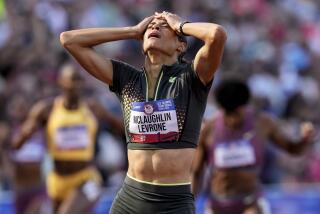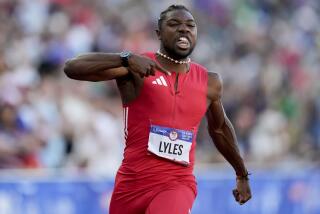Soviet Unionâs Paklin Sets High Jump World Record
Every high has its accompanying low, and nowhere was this more true Wednesday than in the world of international track and field.
The high took place at Kobe, Japan, where the World University Games closed in rarefied air when Igor Paklin of the Soviet Union broke the world record in the high jump, leaping 7-10 3/4.
The low occurred at a meet in Rieti, Italy, where Said Aouita of Morocco, the hottest distance runner in the world this year, pulled a leg muscle in an unsuccessful attempt to break the world record in the 2,000 meters.
Paklinâs leap made him the second Soviet jumper in less than a month to break the world mark.
On Aug. 11, Rudolf Povarnitsin set the standard of 7-10 1/2. Paklin broke the record on his third attempt at the height. He then failed in three attempts at 7-11 1/2. Organizers tried to hurry Paklin through his last efforts so as not to keep the crowd of 50,000, including Japanâs Crown Prince Akihito, waiting for the closing ceremony.
âBefore the last two tries at 7-11 1/2, I was told to hurry because time was running out, and there was the closing ceremony, but I didnât let that bother me,â Paklin said. âI thought I could jump higher.â
It was the first track and field world record at a University Games since Pietro Mennea of Italy ran the 200 meters in 19.72 seconds at Mexico City in 1979, a record that still stands.
Paklinâs gold medal was the Sovietsâ 44th among the 122 awarded in 11 days of competition featuring nearly 2,800 athletes from 97 nations. In all, the Soviets won 84 medals, while the United States ended up with 66, including 22 golds. It was the Americansâ best total in University Games competition, surpassing the 59 collected at Tokyo in 1967.
After Paklin left the field, musicians and dancers took over. In giant circles, 200 members of the Japan Ballet Assn. danced to Ravelâs âBolero.â
About 2,300 athletes from 82 of the participating nations circled the track, and Primo Nebiolo, president of the International University Sports Federation, declared the Games closed.
The Soviets won two other gold medals on Wednesday in the final dayâs nine track and field events. They won the womenâs 1,600-meter relay in 3 minutes 25.96 seconds, with Canada a distant second in 3:29.06 and the U.S. third in 3:30.41. Margarita Valyukevich won the womenâs long jump with a leap of 23-1.
In Italy, meanwhile, Aouita was as disappointed as Paklin was elated. A physician said it was doubtful the Moroccan runner would recover from the injury in time to run the final Grand Prix event in Rome on Saturday.
Aouita has broken the world records for the 1,500 and the 5,000 meters this year. He won Wednesdayâs 2,000 in 4:54.02, well off the mark of 4:51.39 set by Steve Cram of Britain.
South African-born Sydney Maree of the United States finished second, but established an American record of 4:54.20 in the process, bettering the mark of 4:54.71 set by Steve Scott in 1982. Scott finished third Wednesday, timed in 4:55.82.
âI hope to run in Rome, but I have great pain,â said Aouita, who was limping noticeably when he left the stadium.
The Moroccan was ahead of Cramâs time at the 1,600-meter mark, and he came around the final bend into the stretch with Maree in close pursuit. Some 20 meters from the finish, Aouitaâs arm stabbed down to his left thigh in a gesture of pain, but he managed to finish the race.
In other Rieti highlights, Stefka Kostadinova of Bulgaria won her 23rd straight high jump competition, clearing 6-8, while Maricica Puica of Romania ran the second-fastest time ever in the womenâs 2,000 meters, finishing in 5:30.39, just short of the world record of 5:28.72 held by Tatyana Kazankina of the Soviet Union.
Greg Foster led the American contingent, winning the 110 hurdles in 13.24 seconds, the second-best time in the world this year. Larry Myricks outdistanced Mike Conley in the menâs long jump, winning with a leap of 27-1. Ray Armstead won the menâs 400 meters in 45.24, and Florence Griffith won the womenâs 200 meters in 22.50.
BB
MENâS HIGH JUMP All-Time List
Mark Name Country Year 7-10 3/4 Igor Paklin USSR 1985
7-10 1/2 Rudolf Povarnitsin USSR 1985
7-10 Zhu Jianhua China 1984 7-9 3/4 Patrik Sjoberg Sweden 1985
7-9 Valeri Sereda USSR 1984 7-8 3/4 Gerd Wessig East Germany 1980
7-8 3/4 Carlo Thranhardt West Germany 1984
7-8 3/4 Dietmar Mogenburg West Germany 1984
7-8 3/4 Sergei Sossimovich USSR 1984
7-8 3/4 Eddy Annys Belgium 1985
7-8 1/2 Jacek Wszola Poland 1980
7-8 1/2 Jim Howard United States 1985
7-8 1/2 Sorin Matei Romania 1985
World Record Progression
Mark Name Country Year 7-5 3/4 Valeriy Brumel USSR 1963
7-6* Ni Chih-Chin China 1970 7-6 Pat Matzdorf United States 1971 7-6 1/2 Dwight Stones United States 1973
7-7 Dwight Stones United States 1976 7-7 Dwight Stones United States 1976 7-7 3/4 Vladimir Yashchenko USSR 1977
7-8 Vladimir Yashchenko USSR 1978 7-8 1/2 Jacek Wszola Poland 1980
7-8 1/2 Dietmar Mogenburg West Germany 1980
7-8 3/4 Gerd Wessig East Germany 1980
7-9 Zhu Jianhua China 1983 7-9 3/4 Zhu Jianhua China 1983
7-10 Zhu Jianhua China 1984 7-10 1/2 Rudolf Povarnitsin USSR 1985
7-10 3/4 Igor Paklin USSR 1985
*--Mark never ratified by the International Amateur Athletic Federation but considered statistically valid.EB
More to Read
Go beyond the scoreboard
Get the latest on L.A.'s teams in the daily Sports Report newsletter.
You may occasionally receive promotional content from the Los Angeles Times.






